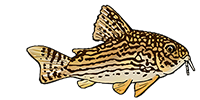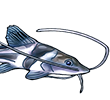I have no idea what the value of researching squirrel's reproductive life is - but it can be quite expensive to do research, if it's over a long period of time for example. Someone obviously approved the research grant, and I don't think they are usually given on "I'd like a nice trip to a warm country, so I'll make you think I'm studying squirrels, while sipping Margeritas on the beach..." - researchers have to explain what they are going to achieve, and why it's "important". Given that there are HUNDREDS of undescribed species in just Loricariidae, I think finding out how long the fish live take a lower priority of the money available for catfish research. And I guarantee you that no one can explain in simple terms why/how, for exampple, Jon Armbruster's, Nathan Lujan's or Mark Sabaj's work is good for the US either. But these people do work on describing new species for us - some of them catfish, but they work on what they can get grants for. Someone interested in squirrels, parrots or spiders can probably quite easily say "The US government spent $X [where X is some large number compared to most people's personal budgets] on studying tropical (cat-)fish for no apparent reason...".
The problem with "polling people". If you ask the average (non-expert) aquarist how long goldfish live, you will PROBABLY get an answer of "1-2 years", yet if you ask someone who actually knows how to care for goldfish, they can live as long as 30 years, and 15-20 is common. Same thing if you ask "how long does a common pleco live?", you will probably not get the "properly cared for" answer that I think is what we want in the Cat-eLog.
We are, however, planning to harvest data from the "My Cats" to get some sort of idea of the lifespan of the fish (we could then draw curves showing that for this particular species, most people keep them for about 5 years, but some live to 25...)
In the case of analyzing bones, scales or something like that, it a) relies on seasonal changes, which may be less pronounced in tropical regions (New Zeeland is not a tropical climate), and how do you know you've found the typical/longest lifespan of a fish - it's the same problem [but a bit harder to analyze] as "max size" of a fish. Until someone catches a bigger one, we only know the size of the biggest one recorded so far...
--
Mats
why is there no expected age/lifetime in Cat-eLog?
- MatsP
- Posts: 21038
- Joined: 06 Oct 2004, 13:58
- My articles: 4
- My images: 28
- My cats species list: 117 (i:33, k:0)
- My aquaria list: 10 (i:8)
- My BLogs: 4 (i:0, p:97)
- Spotted: 187
- Location 1: North of Cambridge
- Location 2: England.
- Jools
- Expert
- Posts: 15993
- Joined: 30 Dec 2002, 15:25
- My articles: 197
- My images: 941
- My catfish: 238
- My cats species list: 87 (i:13, k:1)
- My BLogs: 7 (i:7, p:202)
- My Wishlist: 23
- Spotted: 447
- Location 1: Middle Earth,
- Location 2: Scotland
- Interests: All things aquatic, Sci-Fi, photography and travel. Oh, and beer.
- Contact:
Re: why is there no expected age/lifetime in Cat-eLog?
While an expertise led guess of a lifespan banding for 400+ genera might be of some use, I think it limited and prone to error - as well as perceived versus actual data.
Data regarding lifespan in nature is pretty much unavailable and, I would argue, of less use to an aquarist.
So, my solution to this old chestnut will be to use My Cats data. Over the next week we will introduce email notifications to ask users to update the species they are keeping. If no reply after a year, the species will be marked as no longer kept.
This will build a view of how long people keep their fishes for. Now, I know this isn't an entire longevity picture, particularly lifespan in nature, but I do not think this is the useful thing. I think what we want are two things. To know how long a fish can be expected to live for in captivity (on average and the longest on record) and also to try to beat that record. I appreciate that hard to keep fish will likely have a low average - but that is important to know.
We will introduce a new field onto the catelog for this, I think, around mid 2012 once more data has been accumulated.
Jools
Data regarding lifespan in nature is pretty much unavailable and, I would argue, of less use to an aquarist.
So, my solution to this old chestnut will be to use My Cats data. Over the next week we will introduce email notifications to ask users to update the species they are keeping. If no reply after a year, the species will be marked as no longer kept.
This will build a view of how long people keep their fishes for. Now, I know this isn't an entire longevity picture, particularly lifespan in nature, but I do not think this is the useful thing. I think what we want are two things. To know how long a fish can be expected to live for in captivity (on average and the longest on record) and also to try to beat that record. I appreciate that hard to keep fish will likely have a low average - but that is important to know.
We will introduce a new field onto the catelog for this, I think, around mid 2012 once more data has been accumulated.
Jools
Owner, AquaticRepublic.com, PlanetCatfish.com & ZebraPleco.com. Please consider donating towards this site's running costs.
-
Bas Pels
- Posts: 2899
- Joined: 21 Dec 2006, 20:35
- My images: 1
- My cats species list: 28 (i:0, k:0)
- Spotted: 7
- Location 1: the Netherlands
- Location 2: Nijmegen the Netherlands
- Interests: Central American and Uruguayan fishes
Re: why is there no expected age/lifetime in Cat-eLog?
@ Victor
I think it is not important yet, but it could get more important in the future
For instance, this study might reveal new insights in other squirrels, taxonomic or perhaps even conservationally. The problem with pure science is, it has proven to result in many usable knowledge, but one can not predict what will help and what not
Take the NASA for instance. Why would anyone want to walk on the moon? I would not. But this madness did result in the communication sattellite, for instance, which is worth a dozen times whatever has been spend on spacefright - and now I'm being conservative.
The quest for the mating behaviour of this squirrel might pop up with information about medicinal plants, it could result in new techniques or new equipment worth a fortune
Mind you. I'm not saying I care about the results which are sought, after all, I'm not a aquirrel so why would I want to know how squirrels mate? I could not care less.
But any rediculous project such as this one has a good change of interesting spin offs.
I think it is not important yet, but it could get more important in the future
For instance, this study might reveal new insights in other squirrels, taxonomic or perhaps even conservationally. The problem with pure science is, it has proven to result in many usable knowledge, but one can not predict what will help and what not
Take the NASA for instance. Why would anyone want to walk on the moon? I would not. But this madness did result in the communication sattellite, for instance, which is worth a dozen times whatever has been spend on spacefright - and now I'm being conservative.
The quest for the mating behaviour of this squirrel might pop up with information about medicinal plants, it could result in new techniques or new equipment worth a fortune
Mind you. I'm not saying I care about the results which are sought, after all, I'm not a aquirrel so why would I want to know how squirrels mate? I could not care less.
But any rediculous project such as this one has a good change of interesting spin offs.
cats have whiskers




